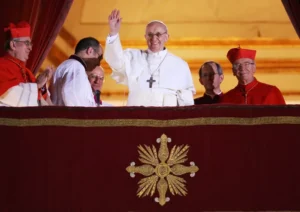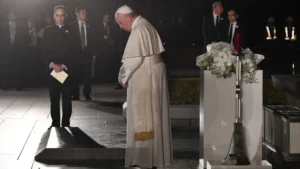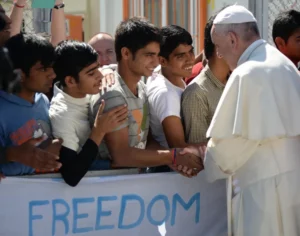Over his 12 years as pope, Pope Francis has left behind major legacies in promoting peace, defending the rights of migrants, and raising awareness about the environment.
In what was likely his final public appearance before the faithful on April 20, Pope Francis reiterated the slogan that has become symbolic of his papacy—a call for dialogue and an end to conflict. Though his voice was weaker than usual, his message still echoed across St. Peter’s Square in Vatican City and was broadcast live to audiences around the world.
According to Vatican News, from the very beginning of his papacy, Pope Francis consistently championed the global Catholic movement for peace. Through his words and actions, he demonstrated an unwavering belief in the power of reconciliation, the importance of dialogue, and the urgent need to end all forms of violence.
And that is one of the greatest legacies Pope Francis leaves behind.

A Tireless Advocate for Peace
Dubbed the “Pope of the Peripheries,” Pope Francis devoted significant attention to those affected by conflict. While praying at renowned locations, he often made time to pray for regions heavily impacted by war.
Recently, he has called on parties involved in the Russia-Ukraine conflict and the Israel-Hamas war to engage in dialogue and work toward lasting peace.
Pope Francis’s calls for peace also reflect on the legacy of past wars—the scars left by violent acts between nations—and his hope that these mistakes will never be repeated. During his visit to Hiroshima and Nagasaki in Japan in November 2019, he issued a strong appeal against nuclear weapons.
“The use of atomic energy for purposes of war is immoral, just as the possession of nuclear weapons is immoral,” the pope stated.
Pope Francis has frequently condemned the arms trade and those who profit from war. Speaking before the U.S. Congress on September 24, 2015, he posed a thought-provoking question:
“Why are deadly weapons being sold to those who plan to inflict untold suffering on individuals and society? Sadly, the answer, as we all know, is simply for money: money drenched in blood, often innocent blood.”
In March 2021, Pope Francis made history by becoming the first pope to visit Iraq. There, he sent a message of unity and hope.

Pope Francis at Hiroshima Peace Memorial Park (Japan) in November 2019
Notably, his meeting with Grand Ayatollah Ali al-Sistani demonstrated the power of interfaith dialogue and mutual respect.
“Peace does not require winners or losers, but brothers and sisters who, despite past misunderstandings and wounds, choose the path of dialogue,” Pope Francis said.
Fighting for the Environment
Throughout his 12-year papacy, Pope Francis has been a leading figure in the global climate movement, according to Time magazine.
“We must act urgently, compassionately, and decisively, because there is no greater threat,” Pope Francis said at the climate summit at the Vatican in 2024. He also described environmental destruction as a “structural sin.”
“We are faced with systemic challenges that are both distinct and interconnected—climate change, biodiversity loss, environmental degradation, global inequality, food insecurity, and threats to the dignity of those most affected,” he said.
In 2015, Pope Francis issued an encyclical letter to bishops, highlighting the intertwined nature of climate change challenges and social justice.
In the letter, he especially noted the disproportionate impact of climate change on the world’s poorest.
“We are not facing two separate crises, one environmental and the other social, but rather one complex crisis that is both social and environmental,” he wrote.
Pope Francis has also met with several climate activists. He met Swedish climate activist Greta Thunberg during the peak of her global campaign urging world leaders to take environmental action.
In 2018, he met with representatives of major oil companies, including ExxonMobil, BP, and Shell, to discuss climate issues. After the meeting, some of these companies issued statements acknowledging the importance of addressing global warming.
Strong Compassion for Migrants
Pope Francis’s time as pope coincided with a global surge in migration. During this period, he actively championed the rights of migrants.
A month before the 2016 U.S. presidential election, Pope Francis addressed the U.S. Congress, opposing Donald Trump’s anti-immigration stance—Trump was a presidential candidate at the time.

Pope Francis meets migrants at a refugee camp in Greece in 2016
“We, the people of this continent, are not afraid of foreigners, because most of us were once foreigners. I speak to you as the son of immigrants, knowing that many of you are also descendants of immigrants,” he said.
Pope Francis also urged European leaders to take stronger action to help refugees making dangerous journeys across the Mediterranean.
“It is hypocritical to call oneself a Christian and yet reject a refugee or someone seeking help, someone who is hungry or thirsty, someone in need,” Pope Francis said during a gathering of German Catholics at the Vatican in October 2016.
His commitment to protecting migrants was not limited to speeches.
During his 2016 visit to the Greek island of Lesbos, he told migrant families, “You are not alone.” He brought 12 migrants back to Rome with him, including six children, according to USA Today.
More Acceptance Toward the LGBTQ Community
During a press conference on a flight to Rome in July 2013, when asked about LGBTQ priests, Pope Francis jokingly responded: “If someone is gay and seeks God and has good will, who am I to judge?” According to NBC News, this simple statement laid the foundation for a more compassionate approach toward the LGBTQ community.
Under Pope Francis’s leadership, the Vatican has introduced key regulatory changes, including allowing transgender people to be baptized and serve as godparents, and permitting priests to bless same-sex couples.
“Homosexual people have the right to be in a family. They are children of God. You can’t kick someone out of a family, nor make their life miserable for this,” Pope Francis said in a 2020 documentary.





